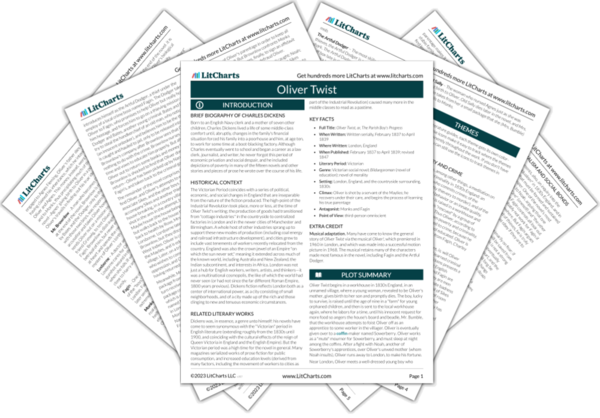Summary
Analysis
The policeman walks Oliver to the magistrate's office, along with the old gentleman. Questioned by a guard at the magistrate's gate, however, the old gentleman says he is not sure that Oliver actually stole the handkerchief—it could have been someone else—and he says he does not want to press charges. But the guard says it is too late at this point; they must see the magistrate about the case.
Brownlow realizes, just by looking at Oliver, that Oliver has the appearance of an honest boy. This is in marked contrast to others in Oliver's life (Bumble, those on the board of the workhouse) who look at Oliver and see only a vicious, lying scoundrel.
Themes
Oliver is thrown into a cell, and the old gentleman looks at him as this is being done; he swears he has seen something like Oliver's face before, but he does not know how or why, nor can he place the face that resembles Oliver's. He is tapped on the shoulder and led by the guard into the office of Mr. Fang, the district magistrate.
The first of a series of "recognitions" that happen in the novel. Most involve Brownlow. Brownlow later figures out that the woman in the portrait—Edward Leeford's intended—is Agnes, Oliver's mother—but he only does so after Oliver is recaptured by Nancy and sent back to Fagin.
Themes
An angry and cruel man, Mr. Fang rules over his courtroom with an iron fist. The old gentleman explains that his name is Brownlow, but before he is allowed to narrate the events of the case—and to plead on Oliver's behalf, since he now thinks Oliver is innocent of the crime—Fang demands that the policeman describe the theft. The policeman must admit, after repeating the sequence of events, that the handkerchief was not found on Oliver, and no one actually witnessed Oliver taking it from Brownlow.
Fang is an exemplar of the "faceless" system of justice holding sway at this time in Victorian England. Fang is capable of dispensing verdicts from his bench without even hearing the substance of a trial—this makes Fang, literally, "judge, jury, and executioner." Dickens lampoons Fang's judicial powers and his inability to hear anyone's side of the case.
Themes
Brownlow tells Fang he is worried that Oliver has been injured by the crowd's beating after the "theft." Fang doesn't listen, and asks Oliver to describe the theft himself. A clerk standing nearby attempts to hear Oliver's words, which are mumbled softly (as Oliver does appear quite ill); the clerk ventures that the boy's name is Tom White (because he cannot hear Oliver speak), and guesses, correctly, that Oliver is an orphan with no permanent home. Fang, believing he has heard enough, sentences Oliver "summarily" to three months' hard labor.
It should be noted that Oliver's real name was given him by Bumble—in other words, Oliver's name is an assumed one (his father's last name, it will later be revealed, is Leeford). Thus "Tom White" is simply another identity layered over Oliver's already "artificial" identity. It is interesting to note that Oliver's last name, Twist, is far more interesting than the name given him by the guard—the generic "White."
Themes
Get the entire Oliver Twist LitChart as a printable PDF.

Just as Fang is delivering the sentence, however, a man rushes into the courtroom: the book-stall's owner, who claims to have seen the theft and to know that Oliver is not the culprit. The bookseller states that he saw two other boys with Oliver, the Dodger and Bates, and that they conspired to steal the handkerchief—Oliver had nothing to do with it. Fang points out that Brownlow is still carrying a book he took from the bookseller's, during the commotion, and for which he did not pay. Fang tells Brownlow he is lucky not to be prosecuted for his own "theft." Fang tells everyone to clear out; he will drop charges against Oliver.
The bookseller emerges just in time. This is a common tactic in Dickens' fiction: a character appears to be in an impossible scrape, only to find out, at the very last second, that he has been rescued. Indeed, this will happen to Oliver throughout the novel—most importantly, when he is taken in by the Maylies after the failed robbery. Oliver's "good luck" in this regard seems to indicate not only that he is the novel's "hero," but that he is protected by some sort of fated good luck.
Themes
Literary Devices
Brownlow is ushered outside by the guard, along with Oliver and the bookseller. Brownlow orders a carriage immediately, as he fears Oliver truly is ill; the three get into the first cab that arrives.
Another rescue. Brownlow has done a 180 degree turn on his appraisal of Oliver—he now wants only to help the young boy.
Themes












